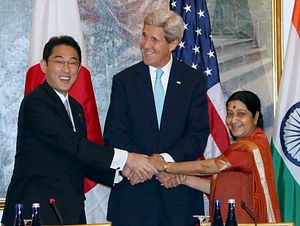During Indian Prime Minister Narendra Modi’s visit to Vietnam, the bilateral relationship between the two countries needs to be elevated to a comprehensive strategic partnership. The evolving security dynamic in the Indo-Pacific region mandates that both countries should collaborate with greater intensity. Furthermore, while substantive attention needs to be focused on bilateral defense and economic cooperation, the need for expanded partnerships or minilaterals should be given serious consideration by India and Vietnam.
Currently, India is involved in trilateral frameworks such as the U.S.-India-Japan Ministerial Trilateral and India-Japan-Australia trilateral at the official level. It should be noted that in the minilateral frameworks involving India, Japan, and the United States, none of the Southeast Asian countries have been represented. Minilateral frameworks involving India and Vietnam look plausible as there are growing convergences in the regional approaches of both the countries.
At the bilateral level, over the decades, India and Vietnam have shared similar views and interests on the global stage. Immediately after independence, both countries worked for decolonization and shared similar conceptions of Asian Solidarity. Today, both countries are interested in a multipolar Asia. This shared interest in multipolarity was reflected in the joint statement issued during the visit Vietnam’s then prime minister, Nguyen Tan Dung, to Delhi in October 2014. The statement referred to “the necessity of maintaining peace in Asia” and called for continued coordination in regional and international fora. Further, Vietnam has consistently supported India’s quest for membership in the United Nations Security Council. There is also a significant commonality in the regional approaches of India and Vietnam specifically with reference to the policies toward the United States and Japan.
India, Vietnam, and Japan
India-Japan relations witnessed significant improvements in the recent past. In 2014, Japan promised to invest $35 billion in India over the next five years and in 2015 a Make in India Special Finance Facility with $12 billion was also initiated. Japan is now a regular participant in the Malabar exercises with India and the United States. India is negotiating with Japan to procure US-2 amphibious aircraft from Japan, and reports suggest that this cooperation may take place under the Make in India initiative.
Similarly, Vietnam has been engaging with Japan under the rubric of “multilateralization and diversification” of its foreign relations. Japan is Vietnam’s biggest bilateral donor, a large trading partner, and the third largest foreign investor in Vietnam. In 2014, Japanese Prime Minister Shinzo Abe and Vietnam’s then-President Truong Tan Sang upgraded the bilateral relationship to an “Extensive Strategic Partnership for Peace and Prosperity in Asia.” Japan has provided six vessels to Vietnam to boost maritime security and Japan’s Self Defense Forces recently docked at Vietnam’s Cam Ranh naval base. Japan is planning to increase the number of defense attaches in Vietnam to facilitate greater cooperation in the security realm between the two countries.
India, Vietnam, and the United States
Given the prolonged war that ended in 1975, Vietnam’s relations with the United States have witnessed a remarkable turnaround. President Bill Clinton and President George W. Bush each visited Vietnam (in 2000 and 2006, respectively). More recently, in 2016, current President Barack Obama visited Vietnam and completely lifted the arms embargo, enabling Vietnam to purchase military equipment such as drones, radars, and P-3 Orion surveillance aircraft from the United States. While there is growing discussion on whether the United States should be provided access to Cam Ranh naval base, it should be noted that access is different from establishment of a foreign military base, which Vietnam may not entertain. Further, Vietnam has signed up to participate in the U.S.-led Trans-Pacific Partnership (TPP). Vietnam’s participation in the TPP is based on the premise that the benefits, especially enhanced access for its textile exports, far outweigh the costs associated with this high-standard regional framework.
Similarly, in the recent past, India-U.S. relations have been on an upswing, and there is growing strategic convergence between the two countries. India-U.S. defense trade, which was near zero in 2005, today stands at approximately $10 billion. The countries recently concluded a modified logistic support agreement and have articulated a joint vision for the Indo-Pacific region. India and the United States consider each other as “closest partners” in the realm of defense cooperation.
These strategic convergences make a strong case for India-Vietnam-Japan and India-Vietnam-U.S. trilaterals. Further, the power dynamic in the Asia-Pacific region should not be merely a consequence of machinations of the big powers. India, Japan, and Vietnam should become active players in shaping the power politics in the region and trilaterals are an important platform to effect such changes.
Like India, Vietnam is uncomfortable with military alliances and allowing foreign military powers to operate bases in its territory. These trilateral partnerships are not alliances, but they constitute frameworks of cooperation for enhancing domestic capacities in the realm of economy and defense preparedness. Therefore, they merit serious consideration.
Sanjay Pulipaka works as a Senior Consultant at the Indian Council for Research on International Economic Relations (ICRIER), New Delhi. The views expressed here are personal.

































